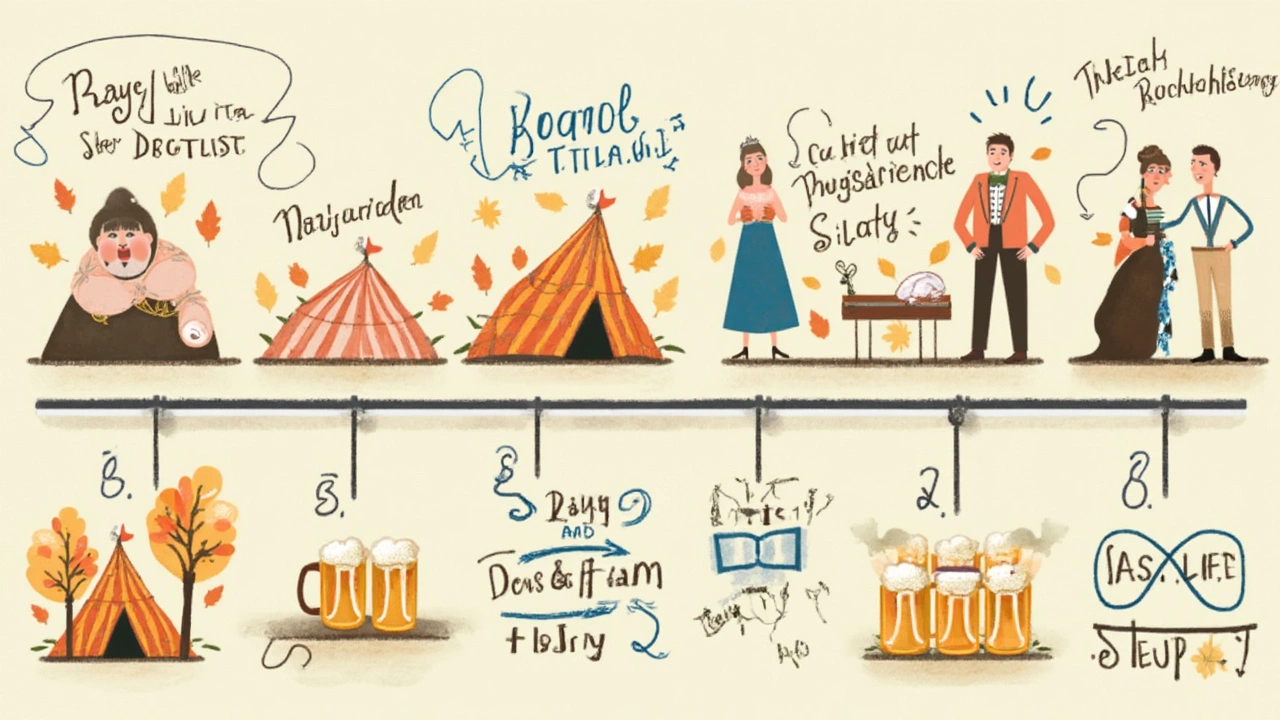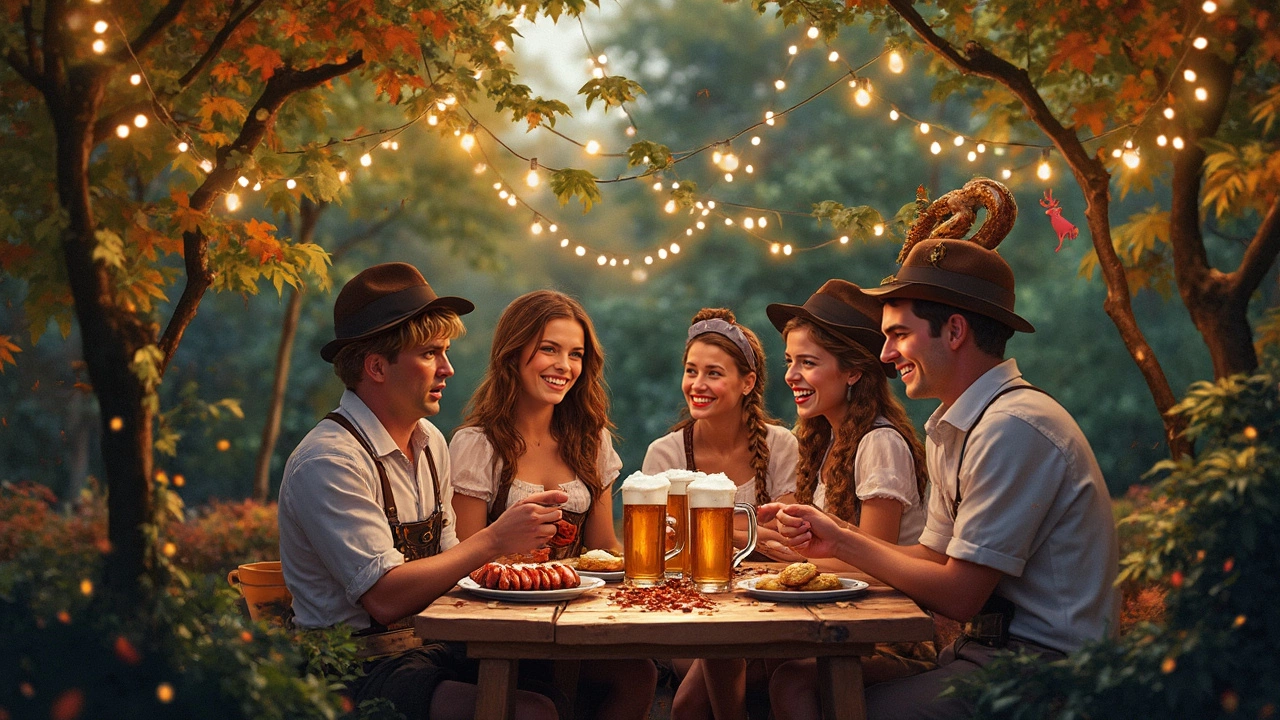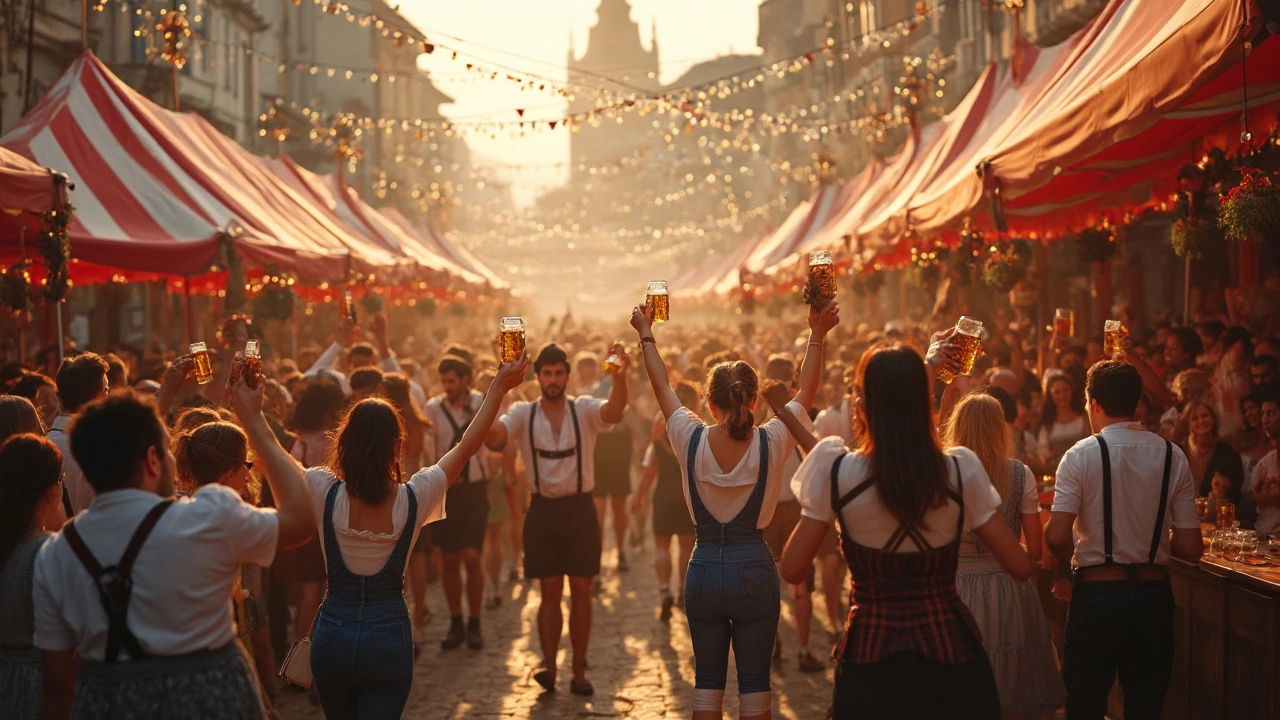For a festival all about giant steins of beer and nonstop toasting, you'd think Oktoberfest would actually happen in October. Nope—most of the action goes down in September. If you've ever scratched your head about this, you're not alone. The name messes with first-timers every year.
The date confusion isn't just a silly oversight or branding gimmick. There's a story behind how it landed in the wrong month, and understanding it can help you appreciate just how much tradition shapes what happens when people gather for fun. Plus, knowing why Oktoberfest is mostly in September can save you from booking flights at the wrong time or missing out on the peak parties.
- The Odd Name-Calendar Mix-Up
- How Oktoberfest Got Its Start
- Why September Makes More Sense
- Oktoberfest Today: What’s Changed?
- Tips for Experiencing Oktoberfest Like a Pro
The Odd Name-Calendar Mix-Up
Here’s where the weirdness starts. Oktoberfest has “October” right in the title, but if you check any Munich event calendar, most of the festival is in September. In 2025, for instance, Oktoberfest kicks off on September 20 and wraps up October 5. That’s just two weeks, and most days are in September. This isn’t a one-off—nearly every year, the pattern repeats.
The name stuck from way back in 1810, when “Oktoberfest” marked a royal wedding bash held in the middle of October. Locals loved it so much that they decided to do it again. At first, it stayed in October. But as the party grew, the weather called the shots. Early fall in Munich means way better beer-drinking weather than later on—think sunny, mild days, not cold and rainy ones. So, over time, organizers pushed the start date earlier and earlier, landing in late September.
If you’re planning to go, ignore the urge to focus on October and look up official dates. Tourists miss out every year by showing up too late, thinking the party’s just getting started, when people are actually sweeping up steins for the season.
| Year | Start Date | End Date | Days in September | Days in October |
|---|---|---|---|---|
| 2023 | September 16 | October 3 | 15 | 3 |
| 2024 | September 21 | October 6 | 10 | 6 |
| 2025 | September 20 | October 5 | 11 | 5 |
So yeah, what you see on the calendar is nothing like what the name suggests. That’s why Germans joke that you need a Septemberfest ticket, not an Oktoberfest one.
How Oktoberfest Got Its Start
The roots of Oktoberfest trace back to October 12, 1810, in Munich, Germany. It all started as a royal wedding bash for Crown Prince Ludwig (who later became King Ludwig I) and Princess Therese of Saxony-Hildburghausen. Instead of throwing just a private party, the couple invited everyone from Munich to join the celebration. The main event wasn't beer, but a giant horse race. Funny enough, nobody called it Oktoberfest yet.
The original party went so well that Munich decided, "Why not do this again next year?" So, they repeated it in 1811, this time adding in things people loved like agricultural shows, food stalls, and—yep—beer stands. From there, the festival slowly picked up all the classics you now expect: carnival rides, parades, and rivers of Bavarian beer. The horse races stuck around for a while but eventually faded out. The real star turned out to be the beer tents.
Here's a quick look at what Oktoberfest looked like in the early days compared to now:
| Year | Main Attraction | Number of Beer Tents | Festival Duration |
|---|---|---|---|
| 1810 | Horse Race | 0 | 1 Day |
| 1820s | Agricultural Show | Handful | Few Days |
| Late 1800s | Beer, Parades | Dozens | 2 Weeks |
| Today | Beer, Music, Food | 14 Large, 20 Small | 16-18 Days |
No matter what year you look at, it’s always been about bringing people together for a good time. Oktoberfest was never meant to be exclusive. That’s one reason why, even two centuries later, millions of folks—locals, tourists, everyone—end up celebrating on Munich’s Theresienwiese fairgrounds every year.

Why September Makes More Sense
It might sound weird, but shifting Oktoberfest from October to September was actually a smart move. The biggest reason? Weather. In Munich, where everything started, September is way warmer and drier than October. That matters when you’re spending hours outside with friends, nursing a massive beer or hitting carnival rides.
If you look at old records, weather wasn’t exactly on Munich’s side in October. It gets chilly fast, and nobody wants their bratwurst soggy in the rain. Organizers figured this out over time. So, by the late 1800s, they quietly nudged Oktoberfest forward on the calendar. Pretty soon, September became the sweet spot for big crowds and good times.
Dr. Thomas S. Aigner, who runs the Munich City Museum’s beer exhibit, once summed it up perfectly:
“September just gives us better beer weather. If Oktoberfest stayed in October, we’d have a lot more cold, wet tourists—and way less fun.”
The stats back this up. Here’s how weather usually looks during Oktoberfest compared to October in Munich:
| Month | Avg High (°C) | Avg Low (°C) | Avg Rainy Days |
|---|---|---|---|
| September | 18 | 9 | 8 |
| October | 13 | 5 | 10 |
Better weather means fewer ruined parade floats, no mud-soaked beer tents, and way more happy festival-goers.
On top of that, the festival lasts up to 18 days, always ending on the first Sunday in October. This keeps the old-school October connection but squeezes every last bit of sunshine out of September. The combo makes planning easier for both locals and visitors. If you ever plan to go, just remember—the real Oktoberfest action starts in September.
Oktoberfest Today: What’s Changed?
Oktoberfest isn’t just a German tradition stuck in time—it’s a living, breathing Oktoberfest that’s changed with the times. The party looks pretty different today compared to its horse-racing, royal-wedding roots back in 1810. For starters, Oktoberfest has exploded. Over six million people show up each year in Munich alone, and that number was climbing steady right up until the pandemic put things on hold in 2020 and 2021.
Some things are stuck—beer still comes only from Munich’s six big breweries: Paulaner, Spaten, Löwenbräu, Augustiner, Hofbräu, and Hacker-Pschorr. You can’t buy any old lager; it has to meet the strict German Beer Purity Law from 1516. But everything else is bigger, faster, and more commercial. Oktoberfest tents now seat thousands, food stands stretch for blocks, and roller coasters stand right next to brass bands.
| Oktoberfest Year | Number of Visitors (Munich) | Beer Consumed (Million Liters) |
|---|---|---|
| 2000 | 6 Million | 5.7 |
| 2019 | 6.3 Million | 7.3 |
| 2023 | 7 Million | 7.5 |
Oktoberfest has also gone global. Plenty of cities—like Cincinnati, Brisbane, and even Tokyo—now run their own versions, though nothing matches the real thing in Munich. The culture’s changed, too. Today you’ll see just as many visitors in traditional Bavarian outfits (lederhosen and dirndl), even if they ordered them online last week. Instagram and YouTube have turned these clothes into must-haves, especially for tourists who want the classic Oktoberfest photo.
One thing people don't expect: family-friendly areas. Oktoberfest doesn't have to be a wild night out. There are plenty of things for kids—like puppet theaters, gentle rides, and carnival games before the party crowd gets rowdy. Organizers work hard to keep it clean and safe, adding public restrooms, security, first-aid tents, and even free water stations for when the beer hits a little too hard.
If you want a seat in a big tent on the weekend, reserve months ahead—otherwise, expect a long wait. For people who want quiet, show up earlier in the day or skip Fridays and Saturdays. Want to see the mayor tap the first keg? That always happens on the first day at noon, and the crowd is huge. No matter what, come hungry. The food is wild: think huge pretzels, roasted chicken, and enough sausages to wallpaper your living room.

Tips for Experiencing Oktoberfest Like a Pro
If you want to enjoy Oktoberfest the way locals do, it pays to know the ropes. This festival gets jam-packed, and there are a few common pitfalls that can leave newcomers stuck outside tents or overpaying for just about everything. Here are details that could be the difference between a forgettable visit and an epic story.
- Book early—like, really early. Hotels in Munich fill up six months in advance. For the big tents, some reservation slots are snapped up as far out as January. No reservation? Aim to get there before noon, especially on weekends, or you’ll struggle finding a seat.
- Dress the part. Wearing "Tracht" isn’t just for Instagram—most attendees really do wear lederhosen or dirndls. You’ll fit in, you’ll get better photos, and you’ll get a smile from the waitstaff.
- Cash is still king. While some places take cards, bring enough euros. Beer and food are ordered inside the tents; most servers still don’t take plastic.
- Pace yourself. Oktoberfest beer is around 6% ABV, higher than most lagers. Eat before you show up and keep eating as you drink. Grab a pretzel, a half-chicken, or classic bratwurst from the food stalls.
- Don’t just stick to beer. Though beer is the headline attraction, wine tents and alcohol-free options are all over the festival grounds if you need a break.
- Explore more than just the big tents. The grounds have rides, parades, and traditional Bavarian games. The “Oide Wiesn” area has an old-school vibe and isn’t as crowded as the main drag.
- Get your bearings. The main festival happens in Theresienwiese. Study the layout map before you go so you don’t wander for hours looking for your favorite beer hall.
If you’re curious about just how massive this thing is, here’s a look at the 2023 numbers:
| Oktoberfest Stat | 2023 Data |
|---|---|
| Total Visitors | 6.5 million |
| Beer Served | 7.2 million liters |
| Hendl (Roast Chickens) Sold | 510,000 |
| Lost & Found Items | 4,250 |
One last echo from my own experience: carry a reusable water bottle, and don’t bother trying to "out-drink" those seasoned locals. They train all year. Make friends instead, join the singalongs, and just roll with the wild, friendly chaos. Rarely do you feel so welcome being a stranger in a foreign city.


